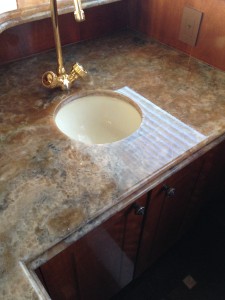Have the classic marble bar tops at places like Hotel Delmano and St. Mazie caught your eye? If you’ve been inspired to install marble or granite countertops after a trip into New York City, sealing the countertop is something you may want to look into to ensure that your counters will be protected against stains.
To check if your counter needs to be sealed, do the following simple test :
- Pour a tablespoon of regular tap water onto the counter and let it sit for 10-15 minutes
- Wipe away water with a dry cloth
- Check if there’s a darkening in the stone.
- If there is, your counters could use some sealer.
- If color hasn’t changed, the stone is sealed.
 Keep in mind that the ability to absorb sealer varies depending on the type of stone as the porosity of the stone determines how well it will absorb the sealer. Knowing your stone type is key to ensure that you’re caring for your counters properly. Most granite is very dense and doesn’t need as much sealer or need to be resealed as often as a stone such as marble, whose lighter colors are very porous and should be checked and protected regularly. On the other hand, certain types of granite, such as Black Absolute, shouldn’t be sealed at all. Sealing your countertops does not protect them against etching, but stains from liquids (even red wine) won’t darken and stain the stone as long as it’s protected. This is one reason why sealing stone is so important. If left unsealed, anything acidic can “etch” or erode the surface of a stone over time. It is important to note that, over time, kitchen and countertop cleaners along with general use can wear away at the sealer, so you should periodically check the seal using the above test. Stone cannot be over-sealed, so when in doubt, err on the side of caution to keep those counters protected!
Keep in mind that the ability to absorb sealer varies depending on the type of stone as the porosity of the stone determines how well it will absorb the sealer. Knowing your stone type is key to ensure that you’re caring for your counters properly. Most granite is very dense and doesn’t need as much sealer or need to be resealed as often as a stone such as marble, whose lighter colors are very porous and should be checked and protected regularly. On the other hand, certain types of granite, such as Black Absolute, shouldn’t be sealed at all. Sealing your countertops does not protect them against etching, but stains from liquids (even red wine) won’t darken and stain the stone as long as it’s protected. This is one reason why sealing stone is so important. If left unsealed, anything acidic can “etch” or erode the surface of a stone over time. It is important to note that, over time, kitchen and countertop cleaners along with general use can wear away at the sealer, so you should periodically check the seal using the above test. Stone cannot be over-sealed, so when in doubt, err on the side of caution to keep those counters protected!
Click here for a quote!